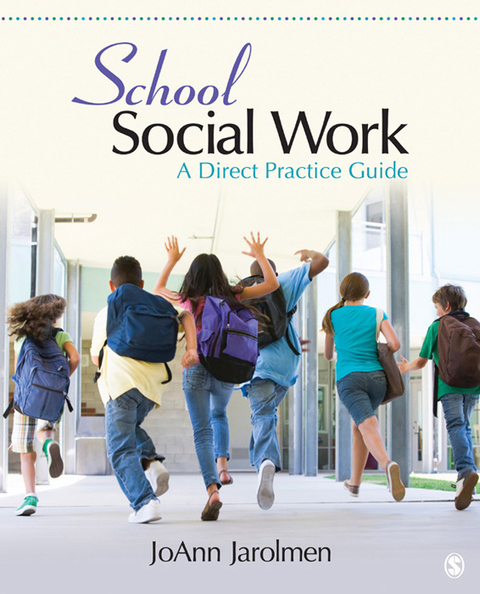Description
Efnisyfirlit
- Cover
- Dedication
- Title Page
- Copyright
- Contents
- Chapter 1. An Overview of the Theoretical Information Necessary in the Field of School Social Work
- A Brief History of Social Work in Schools
- Socioenvironmental
- Professional
- Legal History
- A Systems Approach
- An Ecological Perspective
- Strengths Perspective
- Developmental Theories
- Evidence-Based Practice Modalities
- Cognitive-Behavioral Theory
- Solution-Focused Therapy
- Attachment Theory
- Intrapsychic Humanism Theory
- Play Therapy
- Crisis Theory
- Summary
- Activities
- Self-Reflection Questions
- Class Discussion Questions
- Chapter 2. A Typical Day?
- Introduction
- The Start of the School Year
- Very Special Needs Students
- Groups
- Individual Counseling
- Preevaluation Interventions
- A Social Developmental History
- An Individual Education Program
- Staffings/Prereferrals
- Peer Mediation and Conflict Resolution
- Disciplinary Meetings
- Crises in the School Environment
- Suicide and Death
- Runaways
- Adolescent Pranks
- Acts of Violence
- Fires and Fire Alarms
- Bomb Scares
- Fistfights
- Gang Violence
- Procedures for Dealing With Gangs and Gang-Related Activities
- Things to Sometimes Ignore
- Conferences
- Middle of School Years
- Conclusion of the School Year
- Summary
- Activities
- Self-Reflection Questions
- Class Discussion Questions
- Chapter 3. Introduction and Definitions: Discussion of the Skills, Techniques, and Essential Practices
- Introduction
- Background of Social Work in the School Setting
- The Partnership
- Purpose of Social Work in the Educational Setting
- Definition Section: Terms Defined That Are Used in the School System
- Integrated School Social Work Services
- Social Worker’s Versus Educator’s Background
- Summary
- Activities
- Self-Reflection Questions
- Class Discussion Questions
- Chapter 4. Special Education Component and School Social Work
- Introduction
- Individuals With Disabilities Education Act
- No Child Left Behind and Its Impact on Special Education
- Family Educational and Privacy Act
- The Individualized Family Service Plan
- Response to Intervention
- Social Developmental History
- The Individual Education Program
- Steps in the Evaluation Process from Referral to Classification
- Manifest Determination
- Student’s Present Levels of Educational Performance
- How the Students Disability Affects Involvement and
- Progress in the General Education Curriculum
- (including strengths and needs)
- Current Educational Status
- Statement of Eligibility
- Rationale for the Type of Educational Program and Placement
- Summary
- Self-Reflection Questions
- Class Discussion Questions
- Chapter 5. Collaboration and Consultation With Parents, Faculty, Staff, and Administration
- Introduction
- Parental Involvement
- Working in Collaboration With Educational Advocates
- Developing Rapport With Faculty and Staff
- Consultation and Observation
- Assist Administrators and Teachers to Work Positively With Parents
- Liaison With Family and School
- Safety Issues
- Infusion of Mental Health Into the Curriculum
- Recognizing the Needs of the Marginalized
- Summary
- Activities
- Self-Reflection Questions
- Class Discussion Questions
- Chapter 6. Ethical Dilemmas
- Introduction
- What is Ethics?
- Ethics for School Social Workers
- Models in Ethical Decision Making: Deontological, Teleological, and Social Constructivism Models of Ethical Decisions as Examples
- The Need to Know in School Social Work
- Confidentiality in School Social Work
- When Confidentiality Ends
- Ethical Decision Making
- Stages in Ethical Decision Making
- Social Work Code of Ethics
- Confidentiality Checklist
- Issues Involved in E-Therapy
- Summary
- Activities
- Self-Reflection Questions
- Class Discussion Questions
- Chapter 7. Proficiency in Working With Cultural Competence
- Introduction
- Cultural Competence Assessment Tools
- Self-Awareness and Personal Knowledge
- The Multicultural Awareness, Knowledge, and Skills Survey (MAKSS)
- Issues of Cultural Competence With the Growing Immigrant Populations
- Sexual Orientation (LGBTQ) Issues in Schools
- Racial and Ethnic Diversity
- Religion
- Socioeconomic Status
- Summary
- Activities
- Self-Reflection Questions
- Class Discussion Questions
- Chapter 8. Current Societal Issues Affecting Children in Schools
- Introduction
- Homeless Children and Education
- An Update on Bullying
- An Update on Suicide Among Children and Adolescents
- Immigrant Children, Undocumented Children, and Refugee Children
- Immigrant Children
- Undocumented Children
- Refugee Children
- Children of Incarcerated Parents
- Children Involved with the Department of Human Services and Effects on Education
- Poverty
- Violence and Weapons in Schools
- Violence in schools
- Weapons in Schools
- Parents, Families, and Friends of Lesbians and Gays, and Children of Gays or Lesbians
- Children of Soldiers and/or Veterans
- Summary
- Activities
- Self-Reflection Questions
- Class Discussion Questions
- Chapter 9. Engagement, Assessment, and Intervention Skills in the School for Individuals Using Evidence-Based Practice Modalities and Other Practice Methods
- SECTION I
- Introduction
- Referral
- Engagement
- Assessment
- Informal Assessment
- More Formal Assessment Tools
- Evidence-Based Practice in School Social Work
- Cognitive-Behavioral Therapy
- Solution-Focused Brief Approach
- Assessment of Some of the Most Common Problems Seen in School-Aged Children
- Autism
- Evidence-Based Treatment Approaches to Autism
- Oppositional Defiant Disorder and Conduct Disorder
- Evidence-Based Treatment Approaches to Oppositional Defiant Disorder and Conduct Disorder
- Parent-Child Interaction Therapy
- Attention Deficit Hyperactivity Disorder
- Evidence-Based Treatment Approaches to Attention Deficit Hyperactivity Disorder
- Posttraumatic Stress Disorder
- Evidence-Based Treatment Approaches to PTSD
- Anxiety Disorders
- Evidence-Based Treatment Approaches to Anxiety Disorder
- Eating Disorders
- Evidence-Based Practice Approaches to Eating Disorders
- Substance Abuse Disorders
- Evidence-Based Practice Approaches to Substance Abuse Disorder
- Use of School-Linked Services
- Activities
- Self-Reflection Questions
- SECTION II
- Introduction
- Crisis Intervention
- Roberts’s Stages of Crisis Intervention
- Intrapsychic Humanism
- Attachment Therapy
- Play Therapy
- Sand Tray Therapy
- School-Based and School-Linked Services
- Case Study to be Evaluated by Students
- Summary
- Activities
- Self-Reflection Questions
- Class Discussion Questions
- Chapter 10. Engagement, Assessment, and Intervention Skills in the School for Groups Using a Variety of Practice Methods
- Introduction
- Why Groups?
- Definition
- Group Selection
- Assessment of Group Members
- Group Purpose
- Group Goals
- Confidentiality in Groups
- Practical Considerations
- Types of Groups Used by Social Workers
- Support Groups
- Task Facilitation Groups
- Psychoeducational Groups
- Counseling Groups
- Psychotherapy Groups
- Brief Groups
- Single-Session Groups
- Stages of Groups
- Gazda Model
- Crespi Model
- Group Time and Place
- Cognitive-Behavioral Groups
- Solution-Focused Groups
- Evaluation
- Summary
- Activities
- Self-Reflection Questions
- Class Discussion Questions
- Chapter 11. Studies, Analysis, and Discussion From an Authentic School Practice Perspective
- Introduction
- Student Intern Interventions
- Mary
- Joe
- Miriam
- Sam
- James
- Carol
- Personal Vignettes and Reflections From Actual School Social Work Practice
- Alicia: A Case of Emotional Disability
- Leon: A Case of Emotional Disability
- Seth: A Case of Other Health Impaired
- Ana: A Case of Neurological Impairment
- Nicky: A Case of Visual Impairment
- Jack: A Case of Social Maladjustment
- Matt: A Case of Orthopedically Handicapped
- Carla: A Case of Multiple Disabilities
- Marian: A Case of Developmental Disability
- James: A Case of Profound Intellectual Disability
- Larry: A Case of Traumatic Brain Injury
- Emotional Toll on Social Workers
- Summary
- Activities
- Self-Reflection Questions
- Class Discussion Questions
- Chapter 12. School Policy, Program Development, and Evaluation
- Introduction
- What an Intern Can Do to Develop Needed Programs
- Alcohol and Drug Awareness and Occurrence
- Suicide Prevention
- Columbia University Suicide Screen
- Truancy and School Failure Prevention
- Interventions
- Dropout
- Violence Prevention Approaches
- Bullying
- Child and Sexual Abuse
- Peer Mediation and Conflict Resolution
- Domestic and Partner Violence Prevention
- Adolescent Pregnancy
- Assertiveness Training
- Special Education Program Development
- Summary
- Activities
- Self-Reflection Questions
- Class Discussion Questions
- Helpful Websites
- Chapter 13. Practice Evaluation
- Introduction
- Macro Practice Evaluation
- What Works Clearinghouse
- Education Resources Information Center
- National Library of Education
- Regional Educational Laboratory Program
- Middle States Evaluation
- NASW Standards for School Social Work Practice
- Quantitative and Qualitative Research
- The Student and Families
- System’s Evaluation
- Evaluation of the School Social Work Services
- Summary
- Activity
- Self-Reflection Questions
- Class Discussion Questions
- Chapter 14. Global Issues in School Social Work
- Introduction
- A Brief History of International School Social Work
- Canada
- Ghana
- Japan
- Republic of Korea
- Germany
- Hungary
- Malta
- Scandinavian and Nordic Countries
- Problems Faced by the World’s Children
- Future Goals for School Social Work
- Summary
- Activities
- Self-Reflection Questions
- Class Discussion Questions
- Appendix A
- Appendix B
- Appendix C
- Appendix D
- Appendix E
- Appendix F
- Biographical Information
- References
- Index







Reviews
There are no reviews yet.